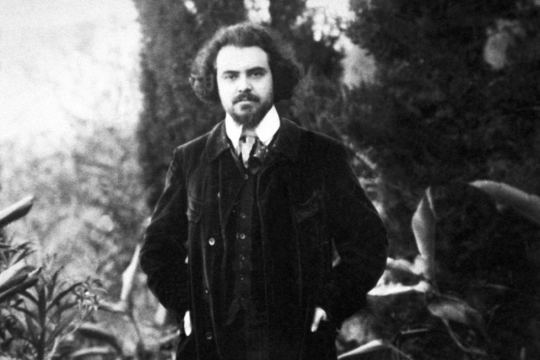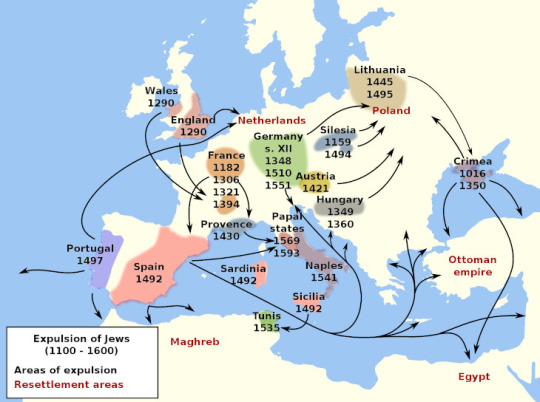#Nikolai Berdyaev
Quote
Pure truth could burst the world apart.
Nikolai Berdyaev, The Spirit and Reality
617 notes
·
View notes
Text

We live in a nightmare of falsehoods, and there are few who are sufficiently awake and aware to see things as they are.
Our first duty is to clear away illusions and recover a sense of reality.
– Nikolai Berdyaev
10 notes
·
View notes
Text
Man’s fate is a mystery, not to be unraveled within the small section of eternal life which we call man’s earthly, empirical life. The destiny of every man is immersed in eternity, and in eternity the deciphering of its meaning is to be sought. Within the limits of our brief life, everything appears accidental, meaningless and unjust. But everything takes on meaning and finds justification in eternity.
Nikolai Berdyaev (1874 – 1948) Russian philosopher, theologian, and Christian existentialist, in The Philosophy of Inequality (1923)
2 notes
·
View notes
Quote
What one needs to do at every moment of one’s life is to put an end to the old world and to begin a new world.
Nikolai Berdyaev
25 notes
·
View notes
Link
Compared to the history of other peoples, Jewish history is just plain weird. Things happen to us, for better or worse, that just don’t happen to anyone else.
Perhaps the best way to see the unique nature of Jewish history is through the eyes of non-Jews who can view it more objectively. These five famous non-Jews have taken note of the uniqueness of the Jews:
1. Blaise Pascal, 17th century French philosopher and mathematician:
This people are not eminent solely by their antiquity, but are also singular by their duration, which has always continued from their origin...and in spite of the endeavors of many powerful kings who have a hundred times tried to destroy them...they have nevertheless been preserved... “Pensees” 1670
2. Thomas Newton, 18th century Bishop of Bristol, England:
The preservation of the Jews is really one of the most signal and illustrious acts of Divine Providence…and what but a supernatural power could have preserved them in such a manner as none other nation upon earth hath been preserved …. We see that the great empires, which in their turn subdued and oppressed the people of God, are all come to ruin… Dissertations on the Prophecies; which have remarkably been fulfilled, and at this time are fulfilling in the world (1754)
3. Leo Tolstoy, Russian novelist:
What is a Jew? This question is not at all so odd as it seems. Let us see what kind of peculiar creature the Jew is, which all the rulers and all the nations have together and separately abused and molested, oppressed and persecuted, trampled and butchered, burned and hanged...and in spite of this is still alive. What is a Jew? Leo Nikolayevich Tolstoy, “Jewish World" periodical, London 1908
4. Mark Twain, American author:
The Egyptian, the Babylonian, and the Persian rose, filled the planet with sound and splendor, then faded to dream -stuff and passed away; the Greek and Roman followed, and made a vast noise, and they are gone The Jew saw them all, beat them all… All things are mortal but the Jew; all other forces pass, but he remains. What is the secret of his immortality? “Concerning the Jews” Harpers, 1899
5. Nikolai Berdyaev, early 20th century Russian philosopher and theologian:
Its survival is a mysterious and wonderful phenomenon demonstrating that the life of this people is governed by special predetermination…The survival of the Jews, their resistance to destruction, their endurance under absolutely peculiar conditions and the fateful role played by them in history; all these point to the particular and mysterious foundations of their destiny... The Meaning of History, 1936
In essence, these five famous personalities are saying: “Isn’t it amazing that the Jewish people have suffered for so long at the hands of so many and yet they have survived, while so many of those nations who persecuted them are gone.”
Why are they all focusing on the same theme? To understand this, we need to take a quick look at a few very unusual aspects of Jewish history:
Hated: The Jewish people have been around for a very long time – more than 3,000 years – and from the get-go they’ve been the objects of intense hatred and persecution, so intense a special word was invented to describe it: antisemitism. Jews have lived around the globe throughout their long history and where ever they went, antisemitism followed.
The hatred of the Jews has proven to be history’s longest, most universal, most irrational and deepest hatred. Logic would dictate that such an intense hatred would make the odds of Jewish survival small indeed, yet this wasn’t the only obstacle the Jews had to overcome.
Exiled: The Jewish people began their national history in the land of Israel 3,300 years ago, where they lived as a nation for over one thousand years, yet they have spent the last two thousand years in exile, wandering around the world as strangers in a strange land. Most of the ancient nations of the world are no longer extant, even though very few of them were exiled from their homeland. Most nations do not survive exile; they assimilate into their host society and over time disappear.

Amazingly, the Jewish people were exiled twice (first 2,500 years ago at the hands of the Babylonians, and then 2,000 years ago by the Romans) and survived! That is unique in the annals of history.
Scattered: If surviving as a people in exile for millennium wasn’t a big enough challenge, for most of that time Jews lived in hundreds of communities scattered around the world. Isolation, persecution, expulsion, forced conversion and outright slaughter destroyed many of the communities and stifled population growth. Despite being around for thousands of years and traditionally having high birthrates, the Jewish people remained a tiny nation and today are just .2% of the world’s population.
Jewish survival is one huge contradiction. Exiled, dispersed, few in number and constantly persecuted – all of these factors should have been nails in the coffin of Jewish people’s existence. The Jewish people should have disappeared. Yet the nation survived, outlasting many of those nations who tried to destroy them.
That is what these five non-Jewish thinkers quoted above found so amazing (and none of them witnessed the astounding return and rebirth of Israel in the mid-20th century).
David Ben Gurion, Israel’s first prime minister, once said, “For a Jew to be a realist, he has to believe in miracles.” A cursory glance at the survival of the Jewish people attests to their amazing history.
13 notes
·
View notes
Quote
We live in a nightmare of falsehoods, and there are few who are sufficiently awake and aware to see things as they are. Our first duty is to clear away illusions and recover a sense of reality.
Nikolai Berdyaev
2 notes
·
View notes
Text
youtube
TODAY IN PHILOSOPHY OF HISTORY
Nikolai Berdyaev and Eschatological Providentialism
Monday 18 March 2024 is the 150th anniversary of the birth of Nikolai Alexandrovich Berdyaev (Никола́й Алекса́ндрович Бердя́ев; 18 March, Old Style 06 March, 1874 – 24 March 1948), who was born in Obukhov, near Kiev, on this date in 1874.
Berdyaev was a Russian aristocrat who became a Marxist and then a Christian, and who always seemed to find himself on the wrong side of the authorities in his homeland. Berdyaev applied his Christian personalism to philosophical anthropology and produced a philosophy of history that raises eschatology over salvation history. Like the thought of Simone Weil, this is a providential philosophy of history with a difference.
Quora: https://philosophyofhistory.quora.com/
Discord: https://discord.gg/r3dudQvGxD
Links: https://jnnielsen.carrd.co/
Newsletter: http://eepurl.com/dMh0_-/
Podcast: https://podcasters.spotify.com/pod/show/nick-nielsen94/episodes/Nikolai-Berdyaev-and-Eschatological-Providentialism-e2h9212
Text post: https://geopolicraticus.substack.com/p/nikolai-alexandrovich-berdyaev
#philosophy of history#youtube#Nikolai Berdyaev#providentialism#Christian existentialism#eschatology#existentialism#Youtube
1 note
·
View note
Text







—alienation under capitalism
the fate of man in the modern world by nikolai berdyaev // alienation: the city at night by felix wilkinson // terence mckenna // social isolation by max cavallari // the art of loving by erich fromm // george tooker // the foundations of historical materialism by herbert marcuse
1K notes
·
View notes
Text
"In a certain sense, every single human soul has more meaning and value than the whole of history with its empires, its wars and revolutions, its blossoming and fading civilizations."
- Nikolai Berdyaev
#nikolaiberdyaev#foryou#tumblrpost#source: tumblr#quotes#literature#quoteoftheday#poems and poetry#poetry#life quotes#beautiful quote#bookworm#book quote#book quotes#books#poem#poetic#writers and poets#dead poets society#inspirational#inspo#inspiring quotes#inspiration#fate and destiny#human#humanity
43 notes
·
View notes
Text
We do not know why we love a person; we love for no reason. One cannot love a man for his merits; and in this respect love is like grace which is given freely, not for merits, for nothing. Love is a gracious radiating energy.
Nikolai Berdyaev - 'The Destiny of Man'
13 notes
·
View notes
Quote
There is no objective reality... there is only an illusion of consciousness, there is only an objectification of reality, which was created by the spirit. The origin of life is creativity, freedom; and the personality, subject, and spirit are the representatives of that origin, but not the nature, not the object.
Nikolai Berdyaev, Dream and Reality
#philosophy#quotes#Nikolai Berdyaev#Dream and Reality#objectivity#reality#consciousness#subjectivity#creativity#freedom#personality#spirit
157 notes
·
View notes
Text
Gerçek şudur ki ,sanat simgeseldir ;iki dünya arasına kurulmuş bir köprüdür ;derin hakiki bir geçeği dile getiren bir belirtidir.Sanatın amacıdeneysel gerçeğin üstüne çıkarak gizli duran gerçeği ,doğrudan doğruya degilde yansıtılmış gölgelerle dile getirmektir.Doğrusu dostoyevski kadar deneysel dünya ile ugraşan olmamıştır;sanatı baştan başa manevi dünaynın bu derin gerçeğine devinir…
Nikolay Berdyaev.
6 notes
·
View notes
Text
They have no right to speak for freedom, who recognize freedom only for themselves and their friends.
- Nikolai Berdyaev
2 notes
·
View notes
Quote
The first responsibility of personalism is to see each other person in his or her full depth. This is astonishingly hard to do. As we go through our busy days it’s normal to want to establish I-It relationships — with the security guard in your building or the office worker down the hall. Life is busy, and sometimes we just need to reduce people to their superficial function.
But personalism asks, as much as possible, for I-Thou encounters: that you just don’t regard people as a data point, but as emerging out of the full narrative, and that you try, when you can, to get to know their stories, or at least to realize that everybody is in a struggle you know nothing about.
The second responsibility of personalism is self-gifting. Twentieth-century psychologists like Carl Rogers treated people as self-actualizing beings — get in touch with yourself. Descartes tried to separate individual reason from the bonding emotions. Nikolai Berdyaev said that tends to turn people into self-enclosed monads, with no doors or windows.
Personalists believe that people are “open wholes.” They find their perfection in communion with other whole persons. The crucial questions in life are not “what” questions — what do I do? They are “who” questions — who do I follow, who do I serve, who do I love?
The reason for life, Jacques Maritain wrote, is “self-mastery for the purpose of self-giving.” It’s to give yourself as a gift to people and causes you love and to receive such gifts for others. It is through this love that each person brings unity to his or her fragmented personality. Through this love, people touch the full personhood in others and purify the full personhood in themselves.
The third responsibility of personalism is availability: to be open for this kind of giving and friendship. This is a tough one, too; life is busy, and being available for people takes time and intentionality.
Margarita Mooney of Princeton Theological Seminary has written that personalism is a middle way between authoritarian collectivism and radical individualism. The former subsumes the individual within the collective. The latter uses the group to serve the interests of the self.
Personalism demands that we change the way we structure our institutions. A company that treats people as units to simply maximize shareholder return is showing contempt for its own workers. Schools that treat students as brains on a stick are not preparing them to lead whole lives.
Opinion | Personalism: The Philosophy We Need (Published 2018)
1 note
·
View note
Text
“I have come to Christ through liberty and through an intimate experience of the paths of freedom. My Christian faith is not a faith based on habit or tradition. It was won through an experience of the inner life of a most painful character. I knew no compulsion in my religious life, and I had no experience of authoritarianism either in faith or in the sphere of religious devotion. Can one oppose to this fact dogmatic formulas or abstract theologies? I answer No, for in my case they will never be really convincing.” ~ Nikolai Berdyaev, Freedom and the Spirit
0 notes
Text

"Biz Tanrı’ya, rasyonel düşünce O’nun varlığını talep ettiği için değil, dünya rasyonel düşüncenin geçersiz kaldığı bir gizemle kuşatılmış olduğu için yöneliriz."
[İnsanın Yazgısı, Nikolai Berdyaev]
0 notes